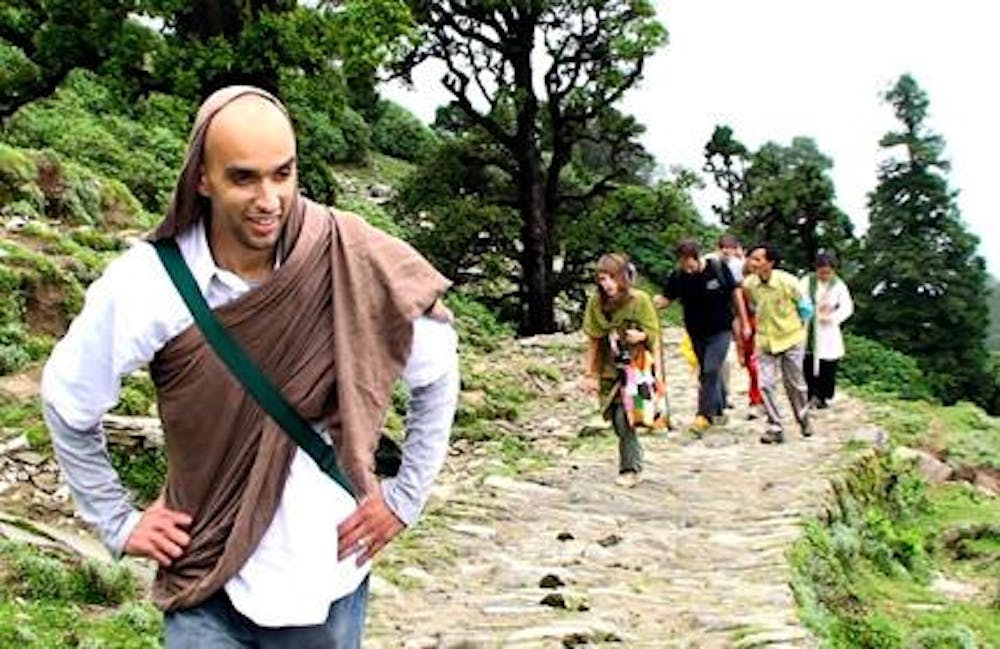Sitting outside of a coffee shop, Hanna Moerland sipped from a cup of tea and reflected on her state of reverse culture shock.
"I'm just enjoying the quiet," she said on the noisy balcony overlooking a Gainesville shopping center parking lot.
Less than a week earlier, the philosophy senior had been in a different, much louder place, where people packed the overpopulated city streets and the rural villages.
Moerland had just returned from more than six weeks of constant noise from buses, people and mosque bells in a country where East meets the West: India.
A total of 23 Gators immersed themselves in a new culture during UF's first India study abroad program, which took place from June 1 to July 13.
Like most students on the trip, Moerland was looking for an atypical study abroad experience.
The UF in India program was dreamt up, taught and guided by married UF professors Travis Smith and Anita Anantharam.
But the trip wasn't designed to be a photo opportunity. It was meant as a tough experience.
The students stayed and worked in a rural, organic farm called Navdanya, which promotes environmental activism as well as farming that protects the land and the farmers who work on it.
Most students lived in huts. Everyone did laundry by hand and took showers from a bucket. Toilet paper and coffee were hot commodities.
As Smith said several times throughout the trip, "This ain't no summer camp."
Few students can say they've made a trek to a Hindu temple atop a mountain or have gone six weeks without a cell phone.
Moerland said she would love to do it all over again.
She knew she wanted to study in India the first time she heard about the opportunity.
However, many of her friends and family members were a little skeptical of her decision at first.
"My family was like, 'Why do you want to go to India? Couldn't you go somewhere else?'" Moerland recalled, laughing a little.
But she wanted to come back with more than the stereotypical European summer study abroad, complete with wild nights of partying.
"I could spend a summer in Gainesville drinking," she said.
The typical day on the farm followed a much different pattern than drink, sleep, repeat.
Each day began at 6 a.m. when the sun lit up the huts and dorm-like rooms the students slept in.
They packed in tea, yoga, breakfast and farm work all before the first class of the day.
After lunch, the students had silent time, a period of daily reflection.
Then it was time for more tea, class and farm work. A little free time ended the day.
Then sleep and repeat.
Smith said the program was intended to create interest in transformation of the self and the world.
Living without American conveniences was one of the biggest challenges - and rewards - for many of the students.
Amy Schweiss, a UF political science junior, loved the inner journey, but the talkative student grappled with silent time.
Schweiss did give up on one American vocal obsession, though - her cell phone.
"I was really into not having a cell phone," she said. "It was a little weird, like I was on the 'Real World.'"
Moerland, who traveled with Schweiss after the program ended, had the same come-around with coffee.
Upon return to the U.S., Moerland has cut back on the caffeine.
At the farm, she was known to sneak around the kitchen for a cup of Anantharam's organic direct-trade Bolivian coffee, which was given to class discussion leaders as a treat.
Though the farm operated as the home base for the group, three weeks of the trip were dedicated to traveling.
The first excursion brought students nine hours away from the farm to Sankri, a more remote mountain in the foothills of the Himalayas.
The 7-kilometer, 45-degree hike was intense, even for those with experience, Anantharam said.
The group camped overnight at the top and carried on their daily routine of yoga and class.
The view and the remoteness brought a certain serenity that couldn't be achieved on the farm.
"Every student that made that hike said that that was their absolute favorite part of the trip," Anantharam said.
UF alumnus James Siler captured all of the adventures in his documentary about trip.
The film, with the working title "Next Item … UF in India," will be screened at the Harn Museum of Art in September.
The documentary filmmaker shot more than 60 hours of footage, including interviews with students before and after the trip.
Though Siler had filmed a fictional picture in India before, he jumped at the chance to return.
He wanted to document the cultural experience and personal transformation of the unique study abroad program.
"We took some of ourselves out there," he said, "but we came back with something new."






